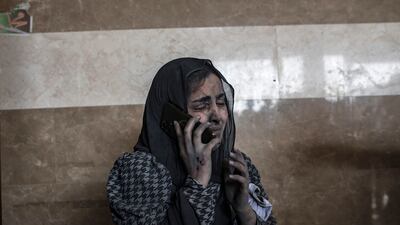Live updates: Follow the latest news on Israel-Gaza
Foad Abdullah Abu Al Qomsan, 2, stands in a garden with neatly combed hair, his brown eyes gazing off-camera as he carries a brightly coloured green lime in his small hands. His parents last saw him on October 31, when an air strike hit the family home in Gaza's Jabalia refugee camp.
Having lost track of him for days, they decided to reach out to Rawan Al Kateri, a Gazan activist with 8,000 followers on Facebook to help find him through the online platform.
Foad is one of the thousands of people being sought by their families after becoming separated amid the horrors and confusion created by the Israeli military assault.
Twelve weeks into a devastating war that has killed more than 20,600 Palestinians, a larger number of families in Gaza do not know the fate of their relatives.
One of the few ways remaining now for families hoping to reunite with their loved ones is to reach out by word of mouth to journalists and people with a large online following to relay their messages with the photos of their relatives and contact numbers.
Ms Al Kateri's post contains a plea from the boy's family for any information about his whereabouts.
With movement across Gaza restricted by Israeli military orders and the fighting between its soldiers and Hamas and other Palestinian militant groups, more and more people are pinning their hopes on social media to track down missing relatives.
While some may be among thousands believed to be buried under the rubble of buildings destroyed by Israeli strikes, others have not been seen since Israeli forces detained them. Some went missing amid the confusion of a war that has displaced 80 per cent of Gaza's 2.3 million population, many of them several times.
Hani Abu Razeq, who has 691,000 followers on Instagram, said people are reaching out to him to post appeals about their missing relatives.
"The situation is so difficult, and the number of missing people is increasing every day, all of that after Israeli soldiers forced people to leave their homes," Mr Razeq told The National.
His posts helped a few people find their relatives.
"I post every day tens of appeals for missing people. Some of them were found and others are still missing, and no news about them."
But the process is lengthy and difficult with recurring internet blackouts and weak phone signals.
Supplies and medicines needed
Others have chosen to post about what Gazans need when aid is restricted and there are warnings of famine in the enclave.
Journalist and social media activist Seba Jaafarawi, publishes several posts a day for people who are running out of medicine and other supplies.
"I am trying to help people to reach what they need. I have, in some cases, succeeded in providing what was asked for, and that makes me feel happy."
Ms Jaafarawi left Gaza one month after the war started on October 7 and said that she is now better able to help people send out their posts due to a stable internet connection.
On her Facebook page, the appeals vary between requests for medicine and for supplies such as mattresses and warm clothes.
"We have left our homes - buildings full of mattresses. We have been humiliated. All night, it's been raining on us. There's snow inside the tent," says one Gazan in a conversation on the social media platform with Ms Jaafarawi who posted it online.
"We are 11 people. We don't have anything except for two thin mattresses and one blanket. We have seven children."
In the conversation, Ms Jaafarawi goes on to ask where the person is so that people can reach them.
"People fleeing from their homes or shelters that have been bombed ask for tents or places to stay in, and I do my best to help them by posting their appeals on Facebook," she told The National.
After Israel invaded neighbourhoods in the northern Gaza Strip and broke into people's homes and shelters, some of the elderly were forced to leave behind their medications and any means of finding their relatives.
"Diabetic patients have asked for their insulin medication, and I try to connect them with pharmacists."


